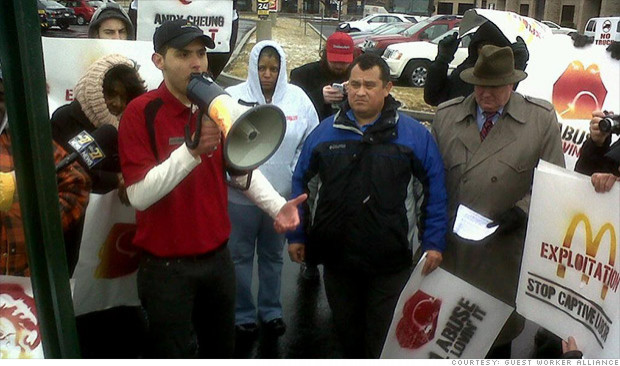Two Pennsylvania Owners Of McDonald’s Stores Say They Choose To Hire Locally; Their Predecessor Chose To Import Foreign Workers For The Job

Stephanie and Christian Rawden, the new sibling owners of six central Pennsylvania McDonald’s franchises, are proving that the previous owner, Andy Cheung, didn’t really need to procure foreign guest workers for his restaurants; that there are in fact enough local residents in and around Harrisburg to fill the need.
This is what the sister-brother team told Patriot News reporter Eric Veronikis in a story published on Tuesday:
Q: Do you employ foreign guest workers?
A: Stephanie: No, we do not.
Q: Any reason why you don’t?
A: Christian: Don’t really have a reason to, I guess, get that creative as far as hiring. Why not hire from the local community?
Q: Would you consider hiring foreign guest workers if approached?
A: Christian: Probably not, unless I was in a situation. I can’t even think of a situation, because we always just hired from the local community. The people who live right there, why would you want to import them from around the globe, when they live right in your back yard?
It would seem obvious that in a metropolitan area of more than 300,000 people, in an economy still in recovery, it would be possible to fill fast-food line-cook positions locally. But Cheung was hiring foreign cultural exchange students. Earlier this year he became embroiled in a labor-relations case so toxic that McDonald’s corporate headquarters in Oak Brook, Ill., demanded he sell his stores and exit the Golden Arches business.
The case, as well as the pledge by the new owners to hire locally, undermines an oft-cited reason for using legal foreign temps and for expanding temporary labor visa programs: that there aren’t enough local unemployed to fill much-needed positions. This has become one of the main justifications for bipartisan calls to increase the number of H1 and H2 visas for professional and nonprofessional foreign temporary and seasonal workers— from computer programmers in Palo Alto to forestry workers in Georgia.
In the case of the Pennsylvania McDonald’s restaurants, the students were in the United States under the J-1 visa, established in 1965 during the height of the Cold War to invite international students to experience American values. In recent years those American values have included luring some of these international exchange students – estimated to number about 100,000 a year – into the country, charging them fees in the thousands of dollars, and then putting them to work in low-paying hourly wage jobs.
Last year, Hershey Co (NYSE:HSY), the renowned American chocolatier, was forced by the Labor Department to pay $200,000 in back wages to more than 1,000 J-1 visa employees who came to American on cultural exchange visas only to wind up packing Halloween candy into boxes in a factory in Palmyra, Pa. SHS Group, a temp agency, Exel, Inc, which oversaw plant operations, and the Council for Educational Travel-USA, a nonprofit, were all fined for their role in minimum-wage, overtime and safety violations.
The case involving former McDonald’s franchise owner Cheung is still being investigated. But what we know is that seven students, six from different South American countries and one from Malaysia, say in their complaint that Cheung paid them $7.25 an hour, housed them in basements of properties he owned in the city, charged them $300 a month rent, called them into work on as little as a half-hour notice and made them work shifts that ranged from a few hours to double and triple consecutive shifts. If they complained, they said their hours were cut. And all the while they were working to pay off the $3,000 fees they paid for the privilege of traveling to the U.S. to learn American values.
The Labor Department wouldn’t comment on the latest developments in the case against Cheung, but late last month the U.S. State Department took punitive action against the New Hampshire-based nonprofit group GeoVisions for recruiting and placing these workers at Cheung’s McDonald’s outlets.
The issue of guest workers has taken a seat closer to the front of the proverbial bus (it’s usually way in the back) as Washington grapples with comprehensive immigration reform. Politicians on both sides of the aisle support the idea of increasing the number of legal immigrants who file in and out of the country each year to work in temporary spurts.
But critics of the current rules, including immigrant rights and labor groups, say there aren’t enough protections for these workers and that they are more appealing to employers because they can’t quit their jobs without leaving the country -- a compelling reason for an indebted foreign worker to tolerate conditions comparable workers would not. After all, citizens and permanent legal residents are free to seek work elsewhere; most guest workers are not.
Proponents of guest worker programs say there are some jobs Americans simply won’t do, or that there aren’t enough local people to hire to fill low-paying or entry-level positions, and that allowing employers to hire guest workers is vital to their ability to stay in business, preserving the jobs of their locally farmed employees.
But the case of the Pennsylvania McDonald’s underscores the reality: whether all employers need these workers or not, not all employers that utilize guest workers are doing so because they cannot find locals willing to do the same work for the same pay.
Stephanie and Christian Rawden proved that in this case the incentive for using guest workers had nothing to do with Cheung’s inability to find locals to do the jobs.
© Copyright IBTimes 2024. All rights reserved.






















